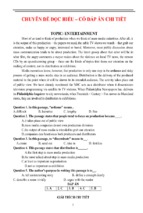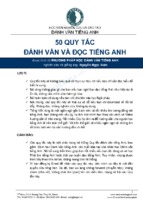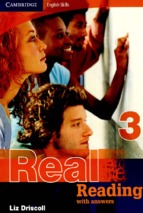GEORGE ELIOT
Silas Marner
The Weaver of Raveloe
Retold by
Clare West
OXFORD UNIVERSITY PRESS
Silas Marner, past and present
In the early years of the nineteenth century, strange-looking
little men were often seen on the country roads, usually with a
heavy bag on their shoulders. They were linen-weavers, taking
the linen they had woven to the women in the villages. Unlike
the strong, healthy country people, they were small and thin,
with tired white faces, bent backs and round shoulders. They
were often shortsighted too, because they had to look so closely
at their work. To the villagers the weavers looked almost
foreign, and quite frightening. Where did they come from? Was
it the devil who sent them? Who were their parents? How could
you trust a man if you didn't know his father or mother?
Country people used to be very suspicious of all strangers and
travellers. They were also suspicious of clever people, people
who could do something they themselves had not learnt to do.
That is why the linen-weavers, who often moved from towns to
live and work in the country, were considered strangers all their
lives by their neighbours, and were sometimes very lonely as a
result.
Silas Marner was one of these weavers. He lived in a small
cottage near the village of Raveloe. Every day he worked at his
loom in the cottage. The small boys of Raveloe had never heard
the sound of a loom before, and sometimes they used to run up
to his house to look quickly in at the window. If Silas noticed
them, he lifted his shortsighted eyes from the loom to stare at the
boys. There was something terrible about his stare, which made
1
Silas Marner
Silas Marner, past and present
the boys run away at once, screaming with fear. The villagers
believed that Silas had an almost devilish power, which he
could use to harm them if he wanted, and so they were all
afraid of him. Raveloe was an important-looking village
with a fine old church and a number of large farms. But it was
at least an hour away from any other village, and very few
strangers visited it, which explains why the villagers' opinions
were so out of date.
Silas Marner had first come to Raveloe fifteen years before, as
a young man. He and his way of life seemed very strange to the
villagers. He worked long hours at his loom, and had no friends
or visitors from the village or anywhere else. He never talked to
his neighbours unless it was necessary for his work, and he never
looked at any of the Raveloe girls. 'Who would want to marry
him anyway?' the girls laughed to each other. 'Marry a dead
man come to life again, with that unhealthy white skin and
those insect-like eyes of his? Certainly not!'
One of the villagers had had a strange experience with Silas.
One evening he had discovered the weaver resting on a field
gate, his eyes open but unseeing, and his body cold and hard, like
a dead man's. After a few moments Silas appeared to wake up,
said 'Goodnight', and walked away.
When this was discussed in the village, some people thought
that Silas had had a fit. But others, like Mr Macey, the church
clerk, refused to accept a medical explanation.
'No, he isn't ill, that weaver,' said old Mr Macey, shaking his
head knowingly. 'If he had a fit, he'd fall down, wouldn't he? I
think his soul flies out of his body sometimes and that's why he
looks so strange. He doesn't come to church, does he? And how
does he know so much about medicines? You all remember how
he made Sally Oates better, when the doctor himself could do no
more for her. That's the devil's work, believe me!'
However, the housewives needed Silas to weave their linen,
and they could find nothing wrong with his work. The years
passed, and Raveloe villagers did not change their opinion of the
weaver. At the end of fifteen years they said exactly the same
things about him, but they believed them more strongly. They
also said that he had saved up a lot of money since he had come
to Raveloe.
Silas had come from a large town to the north of Raveloe.
Here he had lived a very different life. Because he was one of a
large number of weavers, he was not considered strange, and he
belonged to an enthusiastic religious group. They met every
Sunday at the chapel in Light Street. Once, at a chapel meeting,
Silas had become unconscious and had sat without moving,
hearing or seeing, for over an hour. This experience made him
specially interesting to the rest of the group.
'We should not call this strange unconsciousness a fit,' the
minister, Mr Paston, told them. 'No, it's much more than that.
In that moment, when he is absent from us, our young friend
Silas's soul is open, open to a possible message from God. I
believe he has been chosen by God!'
Silas's best friend at chapel was William Dane, a serious
young man who was, some people thought, a little too sure of
his own goodness and cleverness. Silas, however, could see no
fault in him, and trusted his friend completely. They remained
Silas Marner
Silas Marner, past and present
Once, at a chapel meeting, Silas bad been unconscious
for over an hour.
good friends, when Silas became engaged to a young woman,
Sarah, who belonged to the same chapel. In fact Silas was
delighted that Sarah did not mind if William joined them
sometimes on their Sunday walks.
Strangely, when Silas had his fit at the chapel meeting,
William was the only one who disagreed with the minister.
'To me it looks more like the devil's work than God's,'
William had said. 'Look deep into yourself, friend Silas. Is there
any evil hiding in your soul?'
Silas was hurt that his friend doubted him, and he began to be
worried, too, about Sarah. She seemed to be showing signs of
dislike towards him, but when he asked her about it, she did not
give him any answer.
At that time one of the chapel leaders was dangerously ill,
and because he had no family, some of the young men offered to
sit with him at night. One night Silas was sitting alone at the old
man's bedside. Time seemed to pass slowly in the quiet, dark
room. But suddenly he realized that the man was no longer
breathing. He was dead.
'Strange!' thought Silas. 'His body's cold! He's been dead for
some time! Why didn't I notice? Perhaps I've had another fit.
And it's already four o'clock in the morning. Why hasn't
William come? He promised he'd come at two o'clock!' He
hurried out of the house to call the doctor and the minister, and
then went to work as usual, still wondering why William had
not arrived.
But that evening, after work, William came to his room, with
the minister. They were both looking very serious.
Silas Marner
Silas Marner, past and present
'You must come to the chapel at once,' said Mr Paston.
'But why?' asked Silas, looking unhappily at them.
'You will hear when you get there,' was the only answer.
Then, in the chapel, Silas stood alone, in front of all the
people who were once his friends. The room was silent. There
was a pocket-knife in the minister's hand.
'Where did you leave this knife?' he asked.
Silas was trembling at this strange question. 'I don't
remember,' he answered.
'Silas, Silas, you must confess!' cried the minister. 'Tell us the
truth! This knife, your knife, was found at the dead man's
bedside, and the bag of church money, which I saw there myself
only yesterday, has gone!'
Silas did not speak for a moment. Then he said, 'God knows
I did not steal the money. Search my room - you won't find the
money. I'm not a thief.'
'You were the only one in our dead friend's house last night,
when the money was stolen,' said Mr Paston. 'William tells us
he was suddenly ill, which prevented him from coming to take
your place. We will search your room.'
And when they went to Silas's room, William found the
missing bag, now empty, under Silas's bed.
'Silas, my friend,' cried William, 'confess your crime to us
now! Send the devil away from your soul!'
Silas turned to the man he had always trusted. 'William, in
the nine years since we've been friends, have I ever told you a lie?
But God will prove the truth.'
As he looked at William, he suddenly remembered something,
and reddened. He said in a trembling voice, 'The knife wasn't in
my pocket last night!'
'I don't know what you mean,' replied William coldly.
In the strange little world of the Light Street chapel, they did
not believe in the law or judges. They thought only God knew
the answers, so they agreed to draw lots to decide what had
happened. They all went down on their knees to ask for God's
help in finding the truth. Silas knelt with them, sure that God
would prove his honesty. There was silence, as the minister took
one of the papers out of the covered box.
'The lots say that Silas Marner has stolen the money,' he said.
'You will leave the chapel, Silas Marner, and you will not be
accepted back until you confess your crime.'
Silas listened in horror. At last he walked over to William
Dane and said firmly, 'I lent you my knife, you know that. You
stole the money, while I was having a fit, and you've blamed me
for it. But perhaps you'll never be punished, since there is no
God who takes care of the good and punishes the bad, only a
God of lies.'
'You hear, my friends?' said William, smiling sadly. 'This is
the voice of the devil speaking.'
Silas went home. The next day he sat alone for the whole day,
too miserable to do anything. On the second day the minister
came to tell him that Sarah had decided she could not marry
him. Only a month later, Sarah married William Dane, and
soon afterwards Silas Marner left the town.
At Raveloe, Silas shut himself away in his cottage. He did not
want to think about the disaster he had experienced. He could
Silas Marner
not understand why God had refused to help him. But now that
his trust in God and his friends had been broken, he did not feel
strong enough to build up that trust again, in a new church and
with new friends. From now on, he would live in a dark,
loveless, hopeless world.
All that was left to him was his weaving, and he sat at his
loom seven days a week, working all the daylight hours. In the
town he had earned less, and had given much of his money to the
chapel, for the old, the poor, and the sick. But now he began to
earn more than ever before, and there was no reason for him to
give away any of it. He was often paid for his linen in gold. He
discovered that he liked holding the shining coins in his hand
and looking at their bright faces.
In his childhood, Silas had been taught, by his mother, to
make simple medicines from wild flowers and plants. One day
he saw the shoemaker's wife, Sally Oates, sitting at her cottage
door, and he realized she had all the signs of the illness which
had killed his mother. He felt sorry for Sally, and although he
knew he could not prevent her dying, he prepared some
medicine for her which made her feel much better. The
villagers considered this a good example of Silas's strange,
frightening power, but as it had worked for Sally, they started
visiting Silas to ask for help with their own illnesses. But Silas
was too honest to take their money and give them useless
medicine. He knew he had no special power, and so he sent them
away. The villagers believed he was refusing to help them, and
they were angry with him. They blamed him for accidents that
happened to them, and deaths in the village. So poor Silas'
Silas Marner, past and present
Silas liked holding the shining gold coins in his hand.
9
Silas Marner
Godfrey and Dunstan Cass
kindness to Sally did not help him make friends in Raveloe.
But little by little, the piles of gold coins in his cottage grew
higher. The harder he worked, the less he spent on himself. He
counted the coins into piles of ten, and wanted to see them grow
into a square, and then into a larger square. He was delighted
with every new coin, but it made him want another. His gold
became a habit, a delight, a reason for living, almost a religion.
He began to think the coins were his friends, who made the
cottage less lonely for him. But it was only at night, when he
had finished his work, that he spent time with them. He kept
them in two bags, under the floorboards near the loom. Like a
thirsty man who needs a drink, he took them out every evening
to look at them, feel them, and count them. The coins shone in
the firelight, and Silas loved every one of them. When he looked
at his loom, he thought fondly of the half-earned gold in the
work he was doing, and he looked forward to the years ahead of
him, the countless days of weaving and the growing piles of
gold.
The most important person in Raveloe was Squire Cass, a
gentleman farmer, who lived with his three sons in the
handsome red house opposite the church, and owned a number
of farms outside the village. His wife had died many years
before.
One dark November evening, fifteen years after Silas Marner
had first arrived in Raveloe, some of the villagers were drinking
beer in the public house, the Rainbow. Old Mr Macey, the
church clerk, was remembering the Squire's wife.
'She was a wonderful lady,' he said, shaking his grey head
sadly. 'Everything was always so pretty and clean at the Red
House when she was alive! When she died, all those years ago,
the poor Squire, well, he didn't know what to do. And he's still
lonely, believe me! That's why we often see him in here in the
evenings. And another thing, if poor Mrs Cass were alive today,
I'm sure she'd be very disappointed with her sons. The Squire
should make those boys do some work, but instead he lets them
stay at home and gives them money to spend on horses, or
gambling, or women!'
'Come, come, Mr Macey,' said the landlord. 'They're rich
young gentlemen, after all. You can't expect them to work on
the farms like us country people. But you're right about Dunstan
Cass. He's a bad one, he is. Always borrowing money, and never
paying it back. Always gambling, always in trouble! He'll come
to a bad end, he will!'
'But the other two are different,' said the butcher, a red-faced,
smiling man. 'Bob Cass is still only a boy. And Mr Godfrey, the
eldest, well, I don't believe he'll be like his brother Dunstan. Just
look at him! He's got an open, honest face. And he's going to
inherit the Squire's money and all the land. And what's more,
he's going to marry Miss Nancy Lammeter. When she moves
into the Red House as Mrs Godfrey Cass, she'll make life more
comfortable for all the Casses. She'll save the Squire money too
10
11
— 2 — Godfrey
and Dunstan Cass
Silas Marner
Godfrey and Dunstan Cass
- the Lammeters have the best of everything in their house, but
they're very careful with their money.'
The farrier, a small man with a sharp face, always enjoyed
disagreeing with the butcher. 'Mr Godfrey marry Miss Nancy!'
he laughed. 'That's what you think! Haven't you noticed how
Miss Nancy has changed towards Godfrey since last year? You
remember, he was away from home, for days and days. Nobody
knows what he was doing, but Godfrey hasn't been the same
since then. Miss Nancy isn't stupid - she won't marry a man she
can't trust!'
The landlord always tried to prevent his customers from
arguing. 'What you all say is very true. But let's hope that Mr
Godfrey doesn't lose his chance of marrying Miss Nancy.'
Meanwhile, at the Red House, Godfrey Cass was waiting for
his brother in the sitting-room, with a very worried expression
on his handsome face. Soon the door opened, and a heavylooking young man entered. It was Dunstan. He had clearly
been drinking.
'How I hate him!'thought Godfrey.
'Well, sir,' said Dunstan unpleasantly, 'you sent for me, and
as you're the oldest, and you'll be the Squire one day, I have to
obey you. So what do you want?'
'Just listen, will you?' replied Godfrey angrily, 'if you aren't
too drunk to understand! You must pay me back the money I
lent you last month. You know I got it from Fowler, of Church
Farm. He owed the money to the Squire, and asked me to give
it to him. Now the Squire is angry with Fowler for not paying,
and I've got to give the money back!'
Dunstan came close to Godfrey and smiled in an evil way.
'Well, my dear kind brother, why don't you find the money
yourself? That would be much less trouble for me!'
Godfrey controlled himself with difficulty. 'Don't smile at me
like that, or I'll hit you!'
'Oh no, you won't,' answered Dunstan. 'Because if you do,
I'll tell the Squire your secret. I'll tell him that his handsome
eldest son fell in love with that poor girl Molly in the town, and
married her in a hurry. The Squire'll be angry because you
married her in secret, and he'll disinherit you. Then I'll get the
house and land when the old man dies! But don't worry, I'm a
good brother to you. I won't tell him, and you'll find the money
to pay back, I know you will.'
'Where can I get the money from?' cried Godfrey. 'I tell you,
I haven't got any!'
'You could borrow it,' said Dunstan carelessly. 'Or wait —
I've had a better idea. You could sell your horse.'
'Sell Wildfire! You know how much I love that horse!'
'Well, you could ride him to the hunt tomorrow. I know two
or three men who'd be interested in buying him, and they'll be
at the hunt, I'm sure. It'd be easy.'
'No, I haven't got time to go hunting tomorrow. I - I'm going
to Mrs Osgood's birthday dance.'
'Aha!' said Dunstan, laughing. 'And perhaps you'll see sweet
Miss Nancy there - and you'll dance with her - and you'll talk
of love. . .'
'Be quiet!' shouted Godfrey, his face turning red. 'Don't
speak of Miss Nancy like that, or I'll kill you!'
12
13
Silas Marner
Godfrey and Dunstan Cass
'Don't get so angry, brother,' answered Dunstan calmly.
'You've got a very good chance with her. In fact, I advise you to
be nice to her. You and I know that Molly's started drinking.
Well, if she drinks too much one day and dies, then you could
marry Nancy. She wouldn't mind being a second wife, if she
didn't know there was a first. And luckily you've got a kind
brother who'll keep your secret well.'
Godfrey's face was white now, and he was trembling. 'Look,
Dunstan, I've nearly had enough of this. You can push a man
too far, you know. Perhaps I'll go to the Squire now and confess
everything to him. He'll discover the truth one day, because
Molly says she'll come and tell him. She wants everyone to
know we're married. When the Squire knows the truth, you
won't get any more money from me!'
Dunstan replied lightly, 'Do what you like, brother.'
Godfrey hesitated. He knew he had fallen into Dunstan's
trap, when he made the mistake of marrying Molly. It was
Dunstan who had introduced his brother to Molly, hoping that
Godfrey would fall in love and marry her. Dunstan was clearly
delighted that his evil plan had succeeded. Godfrey was now in
a difficult situation. He no longer loved his young wife, and
could not stop thinking of Nancy Lammeter. He felt sure that
with Nancy as his wife he would not need to have secrets, and
could be open and honest with everybody. But for the moment
he had to give Dunstan whatever he wanted, keep Molly happy,
and lie to his father and his friends. If he told his father the truth,
the situation would become impossible. The Squire would
disinherit him and he would be just a poor working man for the
Dunstan came close to Godfrey and smiled in an evil way.
14
15
Silas Marner
Godfrey and Dunstan Cass
rest of his life. And far worse than that, he would lose any hope
of marrying Nancy. No! He could not accept that. He would
find the money for Dunstan, and wait for the situation to get
better. Living with fear in his heart, the fear of being discovered,
was better than living without Nancy's love.
He turned to Dunstan. 'It's just like you to talk of selling
Wildfire - the best horse I've ever had!'
'Let me sell him for you - you know I'm good at buying and
selling. I can ride him to the hunt for you tomorrow, and bring
you back the money. But you must decide. You lent me that
money, and you'll have to pay it back to the Squire. So it's your
problem, not mine!'
Godfrey thought for a moment. 'All right,' he said. 'But make
sure you bring me back all the money, Dunstan!'
The next morning, as Dunstan was riding Wildfire out of
Raveloe, he passed the old quarry. All the stone had been taken
out of it and it was no longer used; now all that was left was a ,
deep hole full of reddish water. Opposite the quarry was Silas
Marner's cottage. Dunstan suddenly had an idea. 'Everybody in
Raveloe talks of the weaver's money- he must have a lot hidden
away in that cottage! Why doesn't Godfrey borrow some
money from him, and pay him back when he becomes the
Squire?' He wondered whether to go back to the Red House at
once, to tell Godfrey about this wonderful idea of his, but he did
not want to miss the hunt, so he decided to continue on his way.
At the hunt he met several friends and neighbours, and before the
hunt started he managed to sell Wildfire for a good price.
The money would be paid when he brought the horse to the
neighbour's house later that day. Dunstan knew it would be
safer to take the horse there immediately, so that he could be
sure of receiving the money. But he was confident that he could
take care of Wildfire during the hunt, and so, after a glass or two
of whisky, he joined the other riders in the fields. This time,
however, he was not as lucky as usual, and horse and rider fell
while jumping a gate. Dunstan got up, shaken but unhurt, but
poor Wildfire's back was broken, and in a few moments he died.
Dunstan looked around, and was glad to see that no other
riders had noticed his accident. He did not want people to think
he was a bad rider. He did not care much about Wildfire,
because he thought he now had a much better plan to offer
Godfrey. The worst thing was that he would have to walk
home, something he was not at all used to doing.
He drank some more whisky from the bottle he kept in his
pocket, and started down the country road. He kept thinking
about Silas's money. There would certainly be enough for his
own needs as well as Godfrey's. Dunstan thought it would be
easy to frighten the weaver a little, and then Silas would quickly
agree to lend his money.
It was four o'clock in the afternoon, and the whole
countryside was covered by a thick mist. Dunstan did not see
anyone on his way back to Raveloe. He knew he was getting
close to the old quarry, although he could not see the road in
front of him. At last he saw light coming from the weaver's
cottage, and he decided to knock at the door. 'Why not ask the
od man for the money now?' he thought.
16
17
Silas Marner
Godfrey and Dunstan Cass
But when he knocked loudly, there was no reply. And when
he pushed the door, it opened. Dunstan found himself in front of
a bright fire which showed every corner of the small livingroom. Silas Marner was not there. Dunstan was tired and cold,
so he went quickly to sit by the warm fire. As he sat down, he
noticed a small piece of meat cooking over the fire. It was
hanging from a large door key.
'So, the old man's cooking meat for his supper, is he?' thought
Dunstan. 'But where is he? Why is his door unlocked? Perhaps
he went out to fetch some wood for the fire, and fell into the
quarry! Perhaps he's dead!' This was an interesting new idea.
'And if he's dead, who inherits his money? Who would know
that anybody had come to take it away?' And the most important
question of all - 'Where is the money?'
Dunstan's excitement made him forget that the weaver could
still be alive. He wanted Silas to be dead, and he wanted Silas's
money. He looked round the cottage again. There was very little
furniture, just a bed, the loom, three chairs and a table. Dunstan
looked under the bed, but the money was not there. Then he
noticed a place on the floor, near the loom, where the
floorboards looked different. By pulling up one of the boards, he
discovered Silas's hiding-place. He took out the two heavy bags
filled with gold, put the boards back and hurried to the door.
Outside, the rain was falling heavily, and he could not see
anything at all. Carrying the heavy bags, he stepped forward
into the darkness.
18
Carrying the heavy bags, Dunstan stepped forward into the darkness.
Where is Silas's gold?
When Dunstan Cass left the cottage, Silas Marner was only a
hundred metres away. He was walking home from the village,
where he had gone to buy what he needed for his next day's
work. His legs were tired, but he felt almost happy. He was
looking forward to supper-time, when he would bring out his
gold. Tonight he had an extra reason to hurry home. He was
going to eat hot meat, which was unusual for him. And it would
cost him nothing, because someone had given him a piece of
meat as a present. He had left it cooking over the fire. The door
key was needed to hold it safely in place, but Silas was not at all
worried about leaving his gold in the cottage with the door
unlocked. He could not imagine that a thief would find his way
through the mist, rain and darkness to the little cottage by the
quarry.
When he reached his cottage and opened the door, he did not
notice that anything was different. He threw off his wet coat,
and pushed the meat closer to the fire. As soon as he was warm
again, he began to think about his gold. It seemed a long time to
wait until after supper, when he usually brought out the coins to
look at. So he decided to bring out his gold immediately, while
the meat was still cooking.
But when he took up the floorboards near the loom, and saw
the empty hole, he did not understand at once. His heart beat
violently as his trembling hands felt all round the hole. There
was nothing there! He put his hands to his head and tried to
think. Had he put his gold in a different place, and forgotten
about it? He searched every corner of his small cottage, until he
could not pretend to himself any more. He had to accept the
truth - his gold had been stolen!
He gave a wild, desperate scream, and stood still for a
moment. Then he turned towards his loom, and almost fell into
the seat where he always worked. He touched the loom to make
sure it, too, had not been stolen. Now he was beginning to think
more clearly. 'A thief has been here! If I can find him, he'll have
to give back my gold! But I was only away for a short time, and
there's no sign of anyone entering the cottage.' He wondered
whether it was really a thief who had taken his money, or
whether it was the same cruel God who had already destroyed
his happiness once. But Silas preferred to suspect a thief, who
would perhaps return the money. He began to think it must be
Jem Rodney, a local poacher, who had known about Silas's
money, and who sometimes visited the cottage. Silas felt
stronger now that he thought he knew the thief. 'I must go and
tell the Squire, and the police!' he said to himself. 'They'll make
Jem give me back the money!' So he hurried out in the rain
without a coat, and ran towards the Rainbow.
He thought he would find the most important people in
Raveloe at the public house, but in fact most of them were at
Mrs Osgood's birthday dance. There were, however, five
villagers at the Rainbow, enjoying an interesting conversation
about ghosts, while drinking their beer.
'I tell you, people have seen ghosts,' the butcher said. 'And I'll
tell you where, too. Behind the church!'
20
21
— 3 —
Where is Silas's gold?
Silas Marner
Where is Silas's gold?
'That's right,' agreed old Mr Macey. 'You young ones aren't
old enough to remember, but people have seen ghosts near the
church since I was a boy. Oh yes, it's true.'
The farrier laughed scornfully. 'Ghosts! People imagine they
see things on a dark night! You can't make me believe in ghosts!
It's a question of fact! There are no ghosts!'
'Now, now,' began the landlord, who always tried to keep
the peace, 'in some ways you're all wrong, and in some ways
you're all right, that's my opinion. There are ghosts, and there
aren't, well, that's what people say. And . . .'
Just then Silas's white face appeared suddenly in the
doorway. He had run all the way from his cottage, so he could
not speak for a moment. He stared silently at the men with his
strange staring eyes, looking exactly like a ghost. For a few
minutes nobody said anything, while Silas tried to control his
breathing. Then the landlord spoke.
'What do you want, Master Marner? Come, tell us.'
'Robbed!' cried Silas, suddenly able to speak. 'I've been
robbed! I want the police, and the Squire!' He waved his arms
wildly as he spoke.
'Hold him, Jem,' said the landlord to the poacher, who was
sitting near the door. 'I think he's gone mad.'
But Jem moved quickly away. 'Not me!' he replied. 'I don't
want anything to do with a ghost!'
'Jem Rodney!' cried Silas, turning and staring at the man he
suspected.
'Yes, Master Marner?' answered Jem, trembling a little.
'If it was you who stole my money,' said Silas, going close to
Jem, 'just give it back to me, and I won't tell the police. Please just give it back.'
'Stole your money!' cried Jem angrily. 'I'll throw this glass at
you if you accuse me of stealing your money!'
'Come now, Master Marner,' said the landlord firmly, taking
Silas by the arm. 'You must explain what you mean if you want
us to believe you. And sit down by the fire to dry your clothes.
You're very wet.'
'That's right,' said the farrier. 'No more staring like a
madman. That's what I thought you were at first - not a ghost,
of course.'
The weaver sat down, in the centre of the little group of men,
and told his story. It felt strange but pleasant to him, to talk to
his neighbours and tell them his problems. The men realized at
once that Silas was telling the truth. They had suspected him of
working for the devil, but they knew now that the devil was no
longer taking care of him.
'Well, Master Marner,' said the landlord in the end, 'you
mustn't accuse poor Jem. He sometimes steals a chicken, we all
know that, but he's been sitting here drinking with us all
evening. So he's not the thief.'
'That's right,' said old Mr Macey. 'You can't accuse
someone who hasn't done anything wrong, Master Marner.'
These words brought the past back to Silas, and he
remembered standing in front of his accusers in the Light Street
chapel. He went up to Jem.
'I was wrong,' he said miserably. 'I'm sorry, Jem. I had no
reason to accuse you. But - where can my gold be?'
22
23
Silas Marner
Godfrey is in trouble
'Perhaps some stranger came to your cottage while you were
out,' said the farrier. 'But we must report the robbery to the
police and the Squire immediately.'
Next morning, when the whole village heard about the stolen
gold, they all discussed it excitedly. A few people still did not
trust Silas or believe his story. Most people, however, were
suspicious of the pedlar who had visited Raveloe the month
before. Perhaps he had returned to hide near the quarry, and
steal the money when Silas left his cottage. Several villagers
thought they remembered his evil-looking face, and felt sure he
was not honest.
Silas himself remembered that the pedlar had come to his
cottage door recently. He hoped the pedlar was indeed the thief,
because the police could catch him and make him give back the
money. His home seemed very empty to him without his gold,
and he desperately wanted to get it back.
Godfrey is in trouble
The weaver sat down and told his story.
24
Godfrey was not very surprised to find that Dunstan had not
come home after his day's hunting. Perhaps he was staying the
night at a public house. But when Dunstan did not return home
the next day, Godfrey began to worry about Wildfire. He did
not trust his brother, and wondered if Dunstan had gone away
to spend the money on gambling. So he decided to go to look for
him. On the road near Raveloe he met his neighbour, John
25
Silas Marner
Godfrey is in trouble
Bryce, who had arranged to buy Wildfire from Dunstan.
'Well, Godfrey,' said Bryce, 'did your brother tell you ab the
horse?'
'What do you mean, John?' replied Godfrey quickly. 'No, 1
hasn't been home yet. What's happened to my horse?'
'Ah, so he was yours, was he? Dunstan told me you'd give
him Wildfire. I was going to buy him, you know.'
'What's Dunstan done? Is Wildfire hurt?' asked Godfr
crossly.
'Worse than that,' answered Bryce. 'I'm afraid your horse!
dead. We've only just found him. Your brother rode him to
the hunt and the horse fell at a gate and broke his back. So
you haven't seen Dunstan since yesterday?'
'No, and he'd better not come home now!' replied Godfrey
angrily. 'How stupid I was to trust him with my horse!'
'But where can Dunstan be? I suppose he wasn't hurt,
because we didn't find him near the horse.'
'Him?' said Godfrey bitterly. 'Oh, he'll be all right.
He'll never be hurt - he only ever hurts other peopled We'll hear
of hir soon enough, don't worry.'
Bryce said goodbye and rode away. Godfrey rode slowly
back into Raveloe, thinking about what he would very soon
have to do. There was no longer any escape. He must confess the
whole truth to his father. For the rest of the day he planned what
he would say. He would explain that he had lent Fowler's
money to Dunstan, because Dunstan knew his secret. That
would be the right moment to tell the Squire about his secret
marriage to Molly. 'But he'll be very angry!' thought
Godfrey.
'And when he's angry with people, he just wants to punish them!
He won't listen or calm down! But perhaps he'll keep my secret
- he's so proud of the family name! And if he disinherited me,
everyone would talk about it.'
When he went to bed that night, Godfrey thought he had
decided what to say. But when he woke up in the morning, he
could not see any reason to confess to the marriage. Why should
he lose the chance of marrying Nancy? Why should he tell the
whole truth now, when perhaps it was not necessary? No, it
would be better to go on in the same way as before. Perhaps
Dunstan would stay away for a while, and then there would be
no need to tell his father about Molly. 'But today I'll tell the
Squire about the money,' he thought. 'He'll have to know about
26
that:
Godfrey was already in the dining-room when his father
arrived for breakfast. The Squire sat down at the head of the
table and ordered the servant to bring him some beer.
'Haven't you had breakfast yet, Godfrey?' he asked.
'Yes, I have, sir,' replied Godfrey, 'but I was waiting to speak
to you.'
'Well, you young people have plenty of time,' answered the
Squire. 'We older ones have to do all the work.'
Godfrey looked straight at his father. 'Sir,' he said bravely, 'I
must tell you - something very unfortunate has happened to
Wildfire.'
'What! Has he broken a leg? I thought you could ride better
wan that! Well, you can't expect me to pay for a new horse. I'm
Ve
ry short of money at the moment. And I'm angry with Fowler
27
Silas Marner
Godfrey is in trouble
- he still hasn't paid me what he owes me. If he doesn't
today, he'll go to prison!' The Squire's face was red, and
banged angrily on the table as he spoke.
'It's worse than breaking a leg,' continued Godfrey miserablj
'Wildfire's dead. But I don't want you to buy me another hor I
just feel sorry I can't pay you — you see, sir, the truth is, I'm ve
sorry, Fowler did pay the money. He gave it to me, and I w|
stupid enough to let Dunstan have it. And he was going to <
Wildfire and then I was going to repay you the money.'
The Squire's face was purple now, and for a moment he
could not speak. 'You — you let Dunstan have my money?
Why did you give it to him? And why did he want it? Where's
Dunstan now? He'll answer my questions, or leave this house!
Go and fetch him at once!'
'Dunstan hasn't come home, sir. The horse was found dead,
and nobody knows where Dunstan is.'
'Well, why did you let him have my money? Answer me!' said
the Squire, staring angrily at Godfrey.
'Well, sir, I don't know,' replied Godfrey, hesitating. He was not
good at lying, and was not prepared for his father's questions.
'You don't know?' the Squire repeated scornfully. 'Well, I
know why. I think you've done something wrong, and you've
bribed Dunstan to keep it a secret! That's it, isn't it?'
The Squire had made a very clever guess, and Godfrey's heart
banged in sudden alarm. He was not ready to confess everything
yet. 'Well, sir,' he said, trying to speak carelessly, 'it was just a
little business between Dunstan and me. You wouldn't be
interested in it, you know.'
'How old are you now? Twenty-six?' asked the Squire
angrily- 'Old enough to look after your money and mine too!
I've been much too generous to you boys, but I'm going to be
harder on you all from now on. You've got a weak character,
Godfrey, like your poor mother. I think you need a wife who
knows what she wants, because you can't decide anything by
yourself! When you were thinking of marrying Nancy Lammeter,
I agreed, didn't I? Have you asked her or not? She hasn't refused
to marry you, has she?'
'No, I haven't asked her,' said Godfrey, feeling very hot and
uncomfortable, 'but I don't think she'll accept me.'
'Don't be stupid, Godfrey!' said the Squire with a scornful
laugh. 'Any woman would want to marry into our family! Do
you want to marry her?'
'There's no other woman I want to marry,' said Godfrey,
avoiding his father's eyes.
'Well, then, let me speak to her father for you, since you
aren't brave enough to do it yourself. She's a pretty girl, and
intelligent.'
'No, sir, please don't say anything at the moment,' said
Godfrey quickly. 'I must ask her myself.'
'Well, ask her then. When you marry her, you'll have to
forget about horses and so on. It'll be good for you to do some
serious work. You should get married soon.'
'Please don't try to hurry things, sir,' begged Godfrey.
'I'll do what I like,' said the Squire firmly. 'And if you don't
do what I want, I'll disinherit you and you can leave the house.
Now, if you know where Dunstan's hiding — I expect you do —
28
29
Silas Marner
Silas's neighbours
tell him he needn't come home. He'll pay for his own food from
now on.'
'I don't know where he is, sir. Anyway, it's you who should
tell him to leave home.'
'Don't argue with me, Godfrey,' said the Squire, turning back
to his breakfast. 'Just go and tell the servants to get my horse
ready.'
Godfrey left the room. He was relieved that his father had not
discovered the whole truth. However, he was a little worried
that the Squire would try to arrange his marriage with Nancy.
While he was married to Molly, he could not marry Nancy,
although it was his dearest wish. But as usual he was waiting and
hoping for some unexpected change in his situation, which
would save him from any unpleasantness.
—5—
Silas's neighbours
'You've got a weak character, Godfrey,' said the Squire angrily.
In the weeks following the robbery, the police tried hard to find
the pedlar, because so many people suspected him of being the
thief. But there was no sign of him in any of the towns and
villages round Raveloe.
Nobody was surprised at Dunstan Cass's absence. Once
before he had stayed away for six weeks and then come back.
Nobody imagined he could have anything to do with the
robbery. The villagers continued to discuss Silas and his lost
gold, but they had no more explanations to offer.
Silas himself still had his loom and his work, so he went on
30
31
Silas Marner
Silas's neighbours
weaving. But the only thing that had made his life worth living
had gone, and now he had nothing to look forward to. A
lifetime of empty evenings lay ahead of him. He did not enjoy
thinking of the money he would earn, because it reminded him
of the money he had lost. As he sat weaving, he sometimes used
to moan quietly to himself. And in the evenings, as he sat alone
in front of the fire, he used to put his head in his hands and moan
again.
But this disaster had one good result. Little by little, Silas's
neighbours realized it was wrong to be suspicious of him. He
was just a poor, simple, harmless man, who needed their help.
They showed their new opinion of him in many different ways.
Some of the women, who were baking cakes and preparing
meat for Christmas, brought him presents of food. Some of the
men, who had nothing to give him, stopped him in the village to
ask about his health, or visited him to discuss the robbery. They
often finished their conversation by saying cheerfully, 'Now
you're the same as the rest of us - we're poor too! Cheer up,
Master Marner! If you get ill and can't work any more, the
Squire'll give you food and your neighbours will take care of
you.' This did not make Silas feel better, but he realized it was
meant kindly.
Old Mr Macey, the church clerk, came to the cottage one
day, to explain how his opinion of the weaver had changed.
'You see, Master Marner,' he said in his high old voice, 'I used
to think you worked for the devil - you've always looked
strange, you know. But now I'm sure you're not evil, just a little
bit crazy. That's what I tell the neighbours.'
He stopped to give Silas time to reply, but the weaver did not
speak. He was sitting with his head in his hands as usual. He
knew that the old man was trying to be kind, but he was too
miserable to show any interest.
'Come, Master Marner, what's your answer to that?' asked
Mr Macey, a little impatiently.
'Oh,' said Silas, slowly lifting his head, 'thank you. Thank
you for your kindness.'
'That's all right,' replied the old man, pleased. 'Now, you
shouldn't sit here moaning, you know. Here's my advice to you.
Ask Tookey in the village to make you a Sunday suit - I don't
expect you've got one - and then you can come to church with
your neighbours. It'll make you feel better. You're not an old
man yet, although you look like one. How old were you when
you came here first? Twenty-five?'
'I don't remember,' answered Silas, shaking his head.
That evening, Mr Macey told a number of villagers at the
Rainbow, 'Poor Master Marner doesn't know how old he is!
And I don't suppose he knows what day of the week it is! He
really is a bit crazy.'
Another villager, Dolly Winthrop, was also worried about
Silas's absence from church. She was a large, fresh-faced woman
with a sweet, patient smile, who was always busy from early
morning until late at night, and who went to church herself
every Sunday. She believed in helping her neighbours, and if
someone in Raveloe was ill or dying, Dolly was often asked to
take care of the patient. This good, sensible woman decided that
Silas needed her help. So one Sunday afternoon she took her
son
32
33
Silas Marner
Silas's neighbours
Aaron, a pretty little boy of seven, to visit the weaver. As they
came closer to the cottage, they heard the sound of the loom.
'Oh dear! Working on a Sunday! That's bad!' said Mrs
Winthrop sadly. She had to knock loudly on the door before
Silas heard. He said nothing, but opened the door to let them in,
and Dolly sat down in an armchair.
'I was baking yesterday, Master Marner,' she said, 'and I've
brought you some of my cakes. Here they are.'
'Thank you,' replied Silas, taking the little bag of cakes Dolly
was holding out to him. Aaron was hiding behind his mother's
chair, in childish fear of the weaver.
'You didn't hear the church bells this morning, perhaps,
Master Marner?' Dolly asked gently. 'This cottage is a long way
from the village.'
'Yes, I heard them,' answered Silas. For him Sunday bells did
not mean anything. There had been no bells at the Light Street
chapel.
'Oh!' said Dolly. 'But - but do you have to work on a
Sunday? You could make Sunday different from the other days,
you know, by washing yourself, and cooking a little piece of
meat, and going to church. And Master Marner, Christmas Day
will be here soon! If you put on your best clothes and go to
church and see the flowers and hear the singing, you'll feel much
better! You'll know there is Someone you can trust!'
Dolly did not usually talk so much, but the matter seemed
extremely important to her.
'No, no,' Silas replied. 'I don't know anything about church.
I've never been to church.'
'Never been!' repeated Dolly. 'Were there no churches in the
town you were born in?'
'Oh yes,' said Silas, 'there were a lot of churches. It was a big
town, you see. But I only ever went to chapel.'
Dolly did not understand this word, but was afraid of asking
any more questions, in case 'chapel' meant something evil. After
considering carefully for a moment, she said, 'Well, Master
Marner, it's never too late to start going to church. It's very
pleasant listening to the singing and the good words. If we go to
church, then when trouble comes, Someone will take care of us.
And if we do our best, then I believe Someone will help us when
we need help.'
Dolly's explanation of her simple religion did not seem at all
clear to Silas, but he did understand that she was asking him to
go to church. He did not want to agree to that. Just then young
Aaron came out from behind his mother's chair, and Silas
offered him one of Dolly's cakes.
'Oh Aaron!' said his mother. 'You're always eating! No,
don't give him any more, Master Marner. But he can sing a song
for you. I'm sure you'll like it. It's a beautiful Christmas carol.
Come, Aaron, let's hear it.'
Little Aaron stood up straight and sang his carol in a clear,
sweet voice. Dolly listened with delight, hoping that the carol
Would help to persuade Silas to come to church.
'You see, Master Marner,' she said when Aaron had finished,
that's Christmas music. The Christmas Day service is wonderful,
Wl
th all the voices and the music. I hope you'll be there with us.
remember, if you feel ill, I'll be happy to come and cook or
34
35
Silas's neighbours
clean for you. But I beg you, please stop weaving on Sundays,
jt's bad for soul and body, I'm sure. We must go now. Goodbye,
Master Marner.'
'Thank you, and goodbye,' said Silas, as he opened the door
for them. He could not help feeling relieved when she had gone.
Now he could weave and moan as much as he liked.
Mr Macey and Dolly had tried hard to persuade Silas to go to
church. But in the end he spent Christmas Day alone in his
cottage, looking out at the cold grey sky. In the evening, snow
began to fall, and he felt more distant and separate from his
neighbours than ever. He sat in his robbed home, moaning
miserably to himself, not noticing that his fire was no longer
burning and that he was getting cold.
But in Raveloe the church bells were ringing and the church
was fuller than all through the rest of the year. It was a special
day for everybody, and after the service they all hurried home in
the biting cold to eat and drink with their families.
At the Red House nobody spoke of Dunstan's absence. The
village doctor, Dr Kimble, and his wife were guests there for
Christmas lunch, and the day passed happily.
The servants, however, were already preparing for the New
Year's Eve dance which Squire Cass gave every year. It was the
best party of the year, and guests used to come from miles
around. Godfrey was looking forward to this year's party more
than usual. But he was still worried.
'What if Dunstan returns?' he thought. 'He'll tell the Squire
about my secret marriage! And Molly's asking for more money!
' 11 have to sell something for cash. But on New Year's Eve, I can
Little Aaron sang his carol in a clear, sweet voice
37
36
- Xem thêm -




















